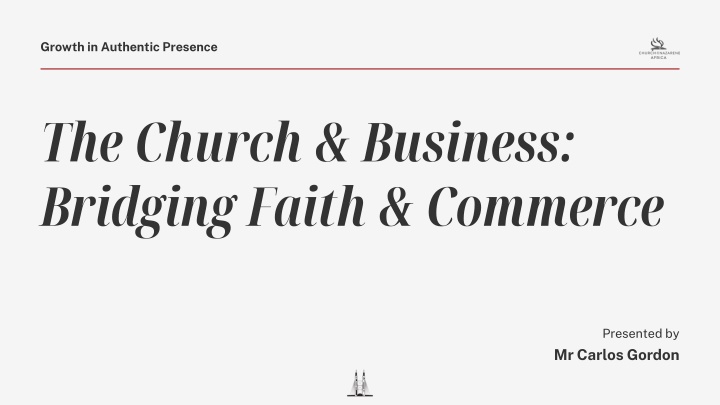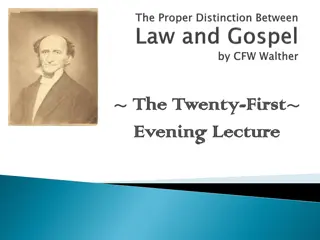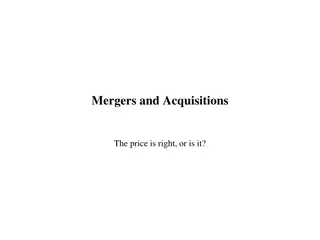Faith and Business Synergy: Bridging Values for Success
Explore the synergies between faith and business, emphasizing how integrating religious values into entrepreneurial efforts can lead to success. Discover how ethical practices aligned with spiritual beliefs can drive profitability and sustainability in the commercial world.
Download Presentation

Please find below an Image/Link to download the presentation.
The content on the website is provided AS IS for your information and personal use only. It may not be sold, licensed, or shared on other websites without obtaining consent from the author.If you encounter any issues during the download, it is possible that the publisher has removed the file from their server.
You are allowed to download the files provided on this website for personal or commercial use, subject to the condition that they are used lawfully. All files are the property of their respective owners.
The content on the website is provided AS IS for your information and personal use only. It may not be sold, licensed, or shared on other websites without obtaining consent from the author.
E N D
Presentation Transcript
Growth in Authentic Presence The Church & Business: Bridging Faith & Commerce Presented by Mr Carlos Gordon
Church & Business Objectives : Explore the relationship between faith and business, emphasizing the potential for integrating religious values into entrepreneurial efforts and vice versa. Examine the concept that ethical and purpose-driven business practices can result in success in the commercial sphere, maintaining alignment with spiritual beliefs. Discuss the synergy between faith, values, and profitability on the journey from religious pews to financial profits.
Church & Business Understanding the Church The church is a unique institution in that it is both divine and earthly. Divine because it relates to worship and service of God and will therefore be governed by divine rule; and earthly because churches have assets to manage, employees to pay and members who rightfully demand accountability for their financial contributions. (Smith, 2011)
Church & Business The Business World: The primary objectives of the business world include: Profit Maximization: A central objective for most businesses is to generate profits and financial returns for their owners, shareholders, or stakeholders Sustainability: Many businesses aim to sustain their operations over the long term, ensuring their viability and stability.
Church & Business The Business World cont d: Market Share Growth: Expanding market share and gaining a competitive edge are common objectives for businesses seeking to capture a larger portion of the market. Customer Satisfaction: Businesses strive to meet the needs and expectations of their customers, building loyalty and repeat business.
Church & Business The Business World cont d: Innovation: Encouraging creativity and innovation is crucial for businesses looking to develop new products, services, and processes to stay competitive. Cost Efficiency: Reducing operational costs and maximizing resource efficiency are key objectives for enhancing profitability.
Church & Business The Business World cont d: Quality Assurance: Maintaining the quality of products and services is essential to ensure customer satisfaction and reputation. Employee Well-being: Fostering a positive work environment, employee development, and well-being is important for attracting and retaining talent.
Church & Business The Business World cont d: Ethical and Legal Compliance: Adhering to ethical and legal standards is crucial to avoid legal issues, protect the reputation of the business, and maintain public trust. Social Responsibility: Many businesses aim to give back to their communities and society through philanthropic activities, environmental responsibility, and ethical business practices. Risk Management: Mitigating risks and uncertainties is a key objective to protect the business from potential financial and operational setbacks.
Church & Business The Way Churches and Businesses Operate: Similarities: Businesses and churches must first appeal to a person in order to draw them in. Businesses and churches must hold the attention of a person in order to get their point across. Businesses and churches must have a compelling argument in order to persuade a decision on behalf of a person. Businesses and churches must treat a person well in order to keep them coming back. Differences: The bottom line of a business is to turn a profit. The bottom line of a church varies depending on who you ask.
Church & Business Do we believe... That Jehovah God is our Provider? That he will bless the work of our hands? That the cattle on a thousand hills belong to him? That we are sons and daughters of the Most-High God? In God s Favour?
Church & Business Why are so many Christians afraid of starting business?
Church & Business Money is the root of all evil!!! 1 Timothy 6:10
Church & Business Ethical Concerns: Some Christians may be concerned about ethical dilemmas they might face in the business world, such as decisions that conflict with their religious values. They may worry about compromising their principles in pursuit of profit.
Church & Business Financial Risks: Starting a business often involves financial risks, and some individuals may feel apprehensive about potentially jeopardizing their financial security, especially if they have family responsibilities.
Church & Business Time Commitment: Running a business can be time-consuming, and some Christians might be concerned that it could interfere with their religious commitments, such as attending church services or engaging in community activities.
Church & Business Lack of Entrepreneurial Experience: Many people, may lack the necessary experience or knowledge to start and run a business. This lack of expertise can be a significant barrier.
Church & Business Fear of Failure: The fear of business failure is common, and it can be especially pronounced among individuals who fear that a failed business venture could have negative consequences for themselves or their families.
Church & Business Cultural Factors: In some cases, cultural or community expectations may discourage or stigmatize entrepreneurship, leading Christians to be hesitant about starting businesses.
Church & Business James 1:5, Which reminds us that God gives wisdom to anyone who asks for it - Not just Church Leaders.
Church & Business People are people: In a business, we call them customers. In a church, we refer to them as the congregation. But, really, they re just people. And when a church or business decides to treat those people with the love of Christ, remarkable things happen.
Church & Business Four Things Church Leaders Can Learn from Business Leaders
Church & Business Manage your money wisely
Church & Business Win the Day We re giving this gift because you have a vision beyond your resources. While we are on the subject, don t let your budget determine your vision. Why? God s vision for you is bigger than yours. Plus, He owns the cattle on thousands hills. By definition, a God-sized dream is beyond your ability and beyond your resources. You can t make it reality, but God can. Mark Batterson
Church & Business Embrace technology and all it offers Social media and the internet aren t going away anytime soon. We can get with the program like the best business leaders or we can expect to no longer be relevant.
Church & Business Work smarter, not harder If our goal is to please God and bring people closer to Him, we serve people best by reserving resources and manpower for only the most worthwhile endeavors. Order doesn t make you cold, and efficiency can still leave room for God s guiding.
Church & Business Stay True to the mission We might be tempted to compare our denominations to others out there but Keep the vision of the church ever-present in your mind.
Church & Business Why is it Important for the Church to be Involved In Business?
Church & Business Think on these things... Are there missed opportunities for churches to address economic inequality and social issues through business ventures? What barriers, whether theological, ethical, or practical, have deterred churches from more extensive engagement in the business sector? Could the church's involvement in business lead to a more ethical and compassionate approach to commerce? Is there a disconnect between the spiritual and material aspects of our lives, and if so, how can the church bridge this gap? In a rapidly changing world, is it time for the church to reconsider its traditional roles and explore new avenues for societal influence, including in the business realm? How can the church inspire and equip its members to be ethical and purpose-driven business leaders in their respective fields?






















